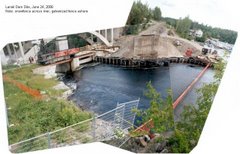http://www.greenparty.ca/media-release/2012-10-18/bill-c-45-greatly-diminishes-right-unimpeded-navigable-waters
Media Release
October 18, 2012
For Immediate Release
October 18, 2012
For Immediate Release
Bill C-45 Greatly Diminishes Right to Unimpeded Navigable Waters
OTTAWA
– In Bill C-38, Stephen Harper gutted environmental laws brought in by
Brian Mulroney. Now he has gone after environmental laws brought in by
Sir John A. Macdonald.
Bill
C-45, a second Act to Implement certain provisions of the budget tabled
in Parliament on March 29, 2012 and other measures, the Conservatives’
latest omnibus bill, has weakened Canadians’ historic right to navigate
the lakes, rivers, and streams of Canada without being impeded by
pipelines, bridges, power lines, dams, mining and forestry equipment,
and more.
The
Navigable Waters Protection Act (NWPA) of 1882, considered Canada’s
first environmental law, has been changed – to the Navigation Protection
Act. If a body of water is not mentioned in Schedule 2 on page 424, it
will no longer be covered under the NWPA permit process from the
rampant resource development being advocated by the Harper
Conservatives.
“This
is nothing less than tragic for the majority of Canadians who love and
respect our waterways from coast to coast to coast,” said Green Party
Leader Elizabeth May, MP Saanich-Gulf Islands. “Even rivers like the
Margaree River in Cape Breton, a National Heritage River, will no longer
be covered by the NWPA. The only river listed in the entire Yukon is
the Yukon River.
“Our inland harbours, including Shoal Harbour in my riding, and gulfs, including the Gulf of St. Lawrence, will be vulnerable.”
The
Conservatives first weakened the NWPA in the 2009 budget when they
curtailed the heritage rights of anglers, hunters, cottagers, and
paddlers to access our streams, lakes, rivers, and other
waterways. Under the previous version of the NWPA, any body of water
deemed navigable could be accessed to the high water mark without that
being considered trespassing.
Under
the Harper version, a natural body of water was considered navigable
only when the Minister of Transport deemed it so. The Minister of
Transport was also given arbitrary power to exempt certain “works” from
assessment or oversight – like dams, bridges, booms, and causeways –
without public consultation, transparent disclosure, or a review of any
kind. The Minister could also set up an arbitrary “class system” for
waterways, and exempt them from the Environmental Assessment Act (now
greatly weakened too).
With
Bill C-38, further changes to the NWPA made pipelines and power lines
exempt from the provisions of the Act. Also, the National Energy Board
took control over the NWPA whenever a pipeline crossed a navigable
water.
“This is a real threat for thousands of our pristine waterways,” said May.
Media Contact:
Debra Eindiguer
debrae1@rogers.blackberry.net
613-240-8921
debrae1@rogers.blackberry.net
613-240-8921
1507-85 Albert Street
Ottawa, ON K1P 6A4
Canada
FOR IMMEDIATE RELEASE
VANCOUVER, BRITISH COLUMBIA (October 19, 2012) – The federal government has repeated its anti-democratic and draconian tactics of Spring 2012 by introducing an omnibus bill that goes far beyond what is justifiable in an actual budget bill –compromising safeguards for the environment and human health without proper study and debate.
Along with over 30 other pieces of legislation, Bill C-45 again takes aim at the Navigable Waters Protection Act (now the Navigation Protection Act) and the Fisheries Act. Once used to steward a sustainable environment, clean water and healthy oceans, these foundational Canadian laws continue to be rewritten to give oil companies an easier ride.
An independent body charged with making science-based decisions to protect Canadians from toxic chemicals and hazardous materials in the workplace has also been eliminated.
“The Bill C-45 ‘budget bill’ is a wolf in sheep’s clothing that will have major implications for the environment and human health,” said Jessica Clogg, Executive Director and Senior Counsel, West Coast Environmental Law. “So much for the federal government’s promise that the bill would and focus on budget implementation and contain no surprises.”
Lowlights of Bill C-45 include:
• confirming that pipelines don’t have to play by the same rules as others when it comes to protecting Canada’s lakes and rivers;
• dramatically limiting the number of waterways protected by the Navigable Waters Protection Act;
• giving industry the option to request that their existing commitments to protect fish habitat be amended or cancelled, or that they be let off the hook for promised compensation for lost or damaged habitat;
• eliminating the Hazardous Materials Information Review Commission; and,
• needlessly tinkering with the Fisheries Act and the Canadian Environmental Assessment Act 2012 to correct obvious drafting mistakes made during the ramming through Omnibus Bill C- 38 and sham of a debate that accompanied it.
-30-
For more information:
Jessica Clogg, Executive Director & Senior Counsel: 604.601.2501
Rachel Forbes, Staff Counsel: 604.601.2508; 604.345.9129 cell; rachel_forbes@wcel.org
West Coast Environmental Law Association
Oct 18, 2012
VANCOUVER — A second
omnibus bill, C-45, tabled today by the federal government picks up where
last spring’s budget bill left off, and further eliminates environmental hurdles
for projects like Enbridge’s Northern Gateway pipeline.
Buried in the 457-page bill are changes to the laws that once protected Canada’s waterways, including the Navigable Waters Protection Act. As a result, of the 32,000 or so lakes in Canada, only 97 are still protected by this law.
Pipelines however, are also directly exempted from this law. Under the Act, pipeline impacts on Canada’s waterways will no longer be considered in environmental assessments.
“Simply put, lakes, rivers and streams often stand in the path of large industrial development, particularly pipelines. This bill, combined with last spring’s changes, hands oil, gas and other natural resource extraction industries a free pass to degrade Canada’s rich natural legacy,” said Devon Page, executive director of Ecojustice.
“With this bill, the federal government’s position is very clear: building pipeline projects like Northern Gateway and making way for increased tanker traffic is more important than safeguarding Canada’s rivers, lakes, streams and oceans. If you fish or play in our waters, or care what goes in your water glass, you should be alarmed.”
The bill also contains changes to Canada Shipping Act, Hazardous Materials Information Review Act, and further changes to the Fisheries Act.
Bill C-45 follows in the wake of Bill C-38, the highly controversial omnibus budget bill unveiled by the federal government last spring. The bill, which pushed through sweeping changes to landmark environmental laws like the Canadian Environmental Assessment Act and Fisheries Act, become a flashpoint for nation-wide protests and a target of international criticism.
“The federal government is giving these industries more than they have ever asked for, all at the expense of average Canadians who want to ensure that we protect our natural legacy for our kids,” Page said.
To arrange an interview, please contact:Kimberly Shearon, communications coordinator | Ecojustice
604.685.5618 x242
kshearon@ecojustice.ca
October 18 2012
Omnibus bill again hides big changes to environmental laws, subverting democracy, weakening protection of air, water, soil and ecosystems
TORONTO, ON -- Once again, the federal government is proposing to make significant changes to environmental legislation without proper democratic debate, according to many of Canada’s leading environmental organizations.
Instead, these changes are contained in a sweeping omnibus budget bill.
Canadians concerned about protecting the air, water, soil and natural ecosystems that support all of us -- and our economy -- are doubly troubled, both by the end-run around democratic process and the potential for even more pollution and destruction of critical habitat.
The bill includes proposed changes to laws protecting fish and navigable waters, preventing harm from hazardous waste and governing the shipping industry.
We will be reviewing these changes in more detail in the coming days to determine what impact they could have on environmental protection.
We note many of these pieces of legislation were also changed by the omnibus bill in the spring. Changing the same bill twice in one year underlines the value of debating specific bills, through appropriate committees—the jobs our MPs are elected to do.
There is no need to subvert our legislative process in this manner, which only serves to heighten fears that already-weakened laws will get weaker still.
The groups issuing this statement are: Canadian Parks and Wilderness Society, David Suzuki Foundation, Ecojustice, Environmental Defence, Equiterre, Greenpeace, Nature Canada, Pembina Institute, Sierra Club Canada, West Coast Environmental Law, WWF Canada
-30-
For more information or interview requests, please contact:
Stephanie Kohls, Communications Director, Environmental Defence, 416-323-9521 ext. 232; 647-280-9521 (cell); skohls@environmentaldefence.ca
Ottawa, ON K1P 6A4
Canada
FOR IMMEDIATE RELEASE
Friday, October 19, 2012
VANCOUVER, BRITISH COLUMBIA (October 19, 2012) – The federal government has repeated its anti-democratic and draconian tactics of Spring 2012 by introducing an omnibus bill that goes far beyond what is justifiable in an actual budget bill –compromising safeguards for the environment and human health without proper study and debate.
Along with over 30 other pieces of legislation, Bill C-45 again takes aim at the Navigable Waters Protection Act (now the Navigation Protection Act) and the Fisheries Act. Once used to steward a sustainable environment, clean water and healthy oceans, these foundational Canadian laws continue to be rewritten to give oil companies an easier ride.
An independent body charged with making science-based decisions to protect Canadians from toxic chemicals and hazardous materials in the workplace has also been eliminated.
“The Bill C-45 ‘budget bill’ is a wolf in sheep’s clothing that will have major implications for the environment and human health,” said Jessica Clogg, Executive Director and Senior Counsel, West Coast Environmental Law. “So much for the federal government’s promise that the bill would and focus on budget implementation and contain no surprises.”
Lowlights of Bill C-45 include:
• confirming that pipelines don’t have to play by the same rules as others when it comes to protecting Canada’s lakes and rivers;
• dramatically limiting the number of waterways protected by the Navigable Waters Protection Act;
• giving industry the option to request that their existing commitments to protect fish habitat be amended or cancelled, or that they be let off the hook for promised compensation for lost or damaged habitat;
• eliminating the Hazardous Materials Information Review Commission; and,
• needlessly tinkering with the Fisheries Act and the Canadian Environmental Assessment Act 2012 to correct obvious drafting mistakes made during the ramming through Omnibus Bill C- 38 and sham of a debate that accompanied it.
-30-
For more information:
Jessica Clogg, Executive Director & Senior Counsel: 604.601.2501
Rachel Forbes, Staff Counsel: 604.601.2508; 604.345.9129 cell; rachel_forbes@wcel.org
West Coast Environmental Law Association
FOR IMMEDIATE RELEASE
Paving the way for pipelines - industry wins, environment loses, more bad news for Canadians
Buried in the 457-page bill are changes to the laws that once protected Canada’s waterways, including the Navigable Waters Protection Act. As a result, of the 32,000 or so lakes in Canada, only 97 are still protected by this law.
Pipelines however, are also directly exempted from this law. Under the Act, pipeline impacts on Canada’s waterways will no longer be considered in environmental assessments.
“Simply put, lakes, rivers and streams often stand in the path of large industrial development, particularly pipelines. This bill, combined with last spring’s changes, hands oil, gas and other natural resource extraction industries a free pass to degrade Canada’s rich natural legacy,” said Devon Page, executive director of Ecojustice.
“With this bill, the federal government’s position is very clear: building pipeline projects like Northern Gateway and making way for increased tanker traffic is more important than safeguarding Canada’s rivers, lakes, streams and oceans. If you fish or play in our waters, or care what goes in your water glass, you should be alarmed.”
The bill also contains changes to Canada Shipping Act, Hazardous Materials Information Review Act, and further changes to the Fisheries Act.
Bill C-45 follows in the wake of Bill C-38, the highly controversial omnibus budget bill unveiled by the federal government last spring. The bill, which pushed through sweeping changes to landmark environmental laws like the Canadian Environmental Assessment Act and Fisheries Act, become a flashpoint for nation-wide protests and a target of international criticism.
“The federal government is giving these industries more than they have ever asked for, all at the expense of average Canadians who want to ensure that we protect our natural legacy for our kids,” Page said.
To arrange an interview, please contact:Kimberly Shearon, communications coordinator | Ecojustice
604.685.5618 x242
kshearon@ecojustice.ca
October 18 2012
Omnibus bill again hides big changes to environmental laws, subverting democracy, weakening protection of air, water, soil and ecosystems
TORONTO, ON -- Once again, the federal government is proposing to make significant changes to environmental legislation without proper democratic debate, according to many of Canada’s leading environmental organizations.
Instead, these changes are contained in a sweeping omnibus budget bill.
Canadians concerned about protecting the air, water, soil and natural ecosystems that support all of us -- and our economy -- are doubly troubled, both by the end-run around democratic process and the potential for even more pollution and destruction of critical habitat.
The bill includes proposed changes to laws protecting fish and navigable waters, preventing harm from hazardous waste and governing the shipping industry.
We will be reviewing these changes in more detail in the coming days to determine what impact they could have on environmental protection.
We note many of these pieces of legislation were also changed by the omnibus bill in the spring. Changing the same bill twice in one year underlines the value of debating specific bills, through appropriate committees—the jobs our MPs are elected to do.
There is no need to subvert our legislative process in this manner, which only serves to heighten fears that already-weakened laws will get weaker still.
The groups issuing this statement are: Canadian Parks and Wilderness Society, David Suzuki Foundation, Ecojustice, Environmental Defence, Equiterre, Greenpeace, Nature Canada, Pembina Institute, Sierra Club Canada, West Coast Environmental Law, WWF Canada
-30-
For more information or interview requests, please contact:
Stephanie Kohls, Communications Director, Environmental Defence, 416-323-9521 ext. 232; 647-280-9521 (cell); skohls@environmentaldefence.ca





























